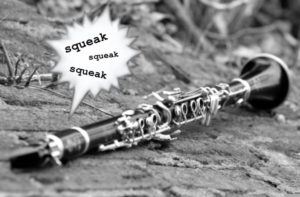Why Am I Squeaking? A Troubleshooting Guide for Clarinetists
To anyone just starting out on their clarinet journey (and even to some seasoned professionals), there is nothing worse than a squeak. The horror, the shame, the embarrassment, the humiliation!
The good news is that you’re in good company – squeaks are part of the growth process for clarinetists, and we have all squeaked (many times!) throughout our clarinet careers.
Squeaks are quite common and can usually be corrected with a few simple fixes. Here are a few troubleshooting tips to help you figure out why you’re squeaking and how you can stop:
- Too much air at once. The clarinet requires a lot of air, but if you use too much at once, it causes the instrument to produce an unexpected overtone, aka a squeak. Keep your air fast and steady for an even sound across all registers.
- Tension in the embouchure. If you are biting the mouthpiece or otherwise playing with too much pressure, this can cause the clarinet to squeak. Make sure your embouchure is firm but not tense, and always avoid biting or using excess pressure to produce any notes.
- Finger squeak. If your fingers accidentally hit another key, this may cause your clarinet to squeak. Practice in front of a mirror so you can check your finger position. (For younger students, check out my article on a specific finger problem which can cause squeaks many beginning students face when they try to cross the break for the first time.)
- Mixed signals. If your air and fingers don’t correspond to the same note, you’re sending the clarinet mixed signals. For example, if you are fingering a low E but using the air stream for an altissimo note, you’ll confuse the clarinet and it might squeak. (You can also intentionally use these mixed signals to create some cool extended techniques, such as bugle calls and harmonic overtone exercises.)
- Check your articulation. Tonguing with improper placement or too much pressure affects the air flow, thus causing the clarinet to squeak. Revisit articulation fundamentals to make sure you aren’t doing anything which might cause the clarinet to squeak.
- Imbalanced reed. If your reed is improperly balanced (meaning the amount of cane is not equal on both sides), then there is a higher likelihood of squeaking. Always make sure to break in and balance your reeds to create your best sound, minus the squeaks! Be sure to check with your band director or private teacher that your reeds are the proper strength, because reeds that are too soft or hard can also cause you to squeak. One other simple reed fix – make sure your reed is wet before playing, as dry reeds are more likely to squeak.
- Taking in too much mouthpiece. Playing with too much of the mouthpiece in your mouth can be a surefire way to squeak. Generally, you should be playing with 1/3 of the mouthpiece in your mouth, but check with your teacher to make sure to make sure you are playing with a proper amount.
- Old and/or defective mouthpieces. If your mouthpiece is broken, old, or otherwise defective, see if the squeaking persists with a different mouthpiece. Mouthpieces change over time, and it’s important to find one that works with your unique teeth, lips, and oral cavity to produce the best sound possible without as many squeaks.
- Make sure your instrument is working properly. If you’re tried everything on this list but the squeaking still persists, take your instrument in to a trusted repair technician to make sure there is nothing wrong with any of the mechanisms.
Remember, squeaks will always be a universal truth (and rite of passage) for clarinetists, but I hope these troubleshooting tips help you eliminate a few squeaks along the way!

3 Comments
Keith
Often when I begin to play, I have no sound, just a hissing bunch of air. Any suggestions?
Saoirse
This helped a lot! They also squeak on rainy days because the humidity and also in mornings.
Pingback: